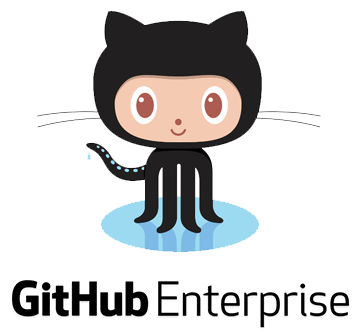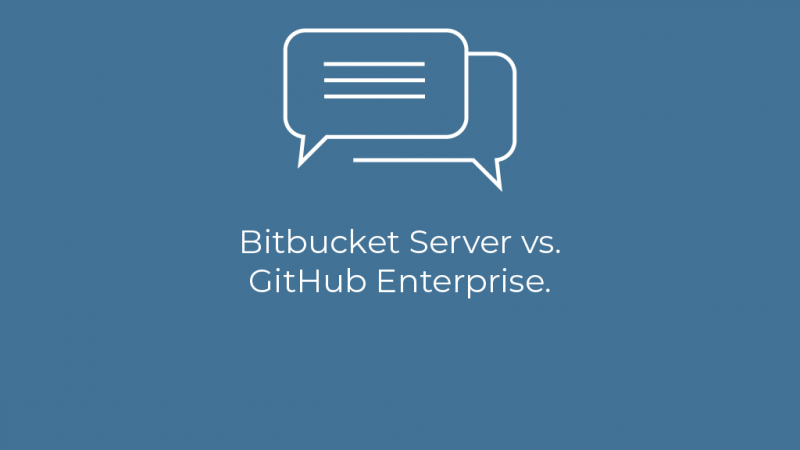You’re using Git. You’re an enterprise organization, with all the growth and complexity that entails. You’re ready to scale.
But which tool should you use?
Two of the top contenders when it comes to Git in the enterprise are Atlassian’s Bitbucket Server (previously Stash Data Center – check out #BuiltWithBitbucket for more info on the change) and GitHub Enterprise. Both tools boast impressive capabilities and the power to bring Git to the enterprise, and deciding which suits you best can be a challenge.
To coincide with Atlassian’s launch of Bitbucket Server, we’ve put together this Bitbucket Server vs. GitHub Enterprise comparison to help you come to a decision. As Git experts with experience working with enterprise companies worldwide, at Clearvision we understand just what it is that makes a tool stand out among the crowd.
The Contenders: Bitbucket Server vs. GitHub Enterprise

Bitbucket Server, in its own words:
Previously known as Stash Data Center, Atlassian’s Bitbucket server offers on-premise source code management for Git that’s secure, fast, and enterprise grade.
Bitbucket Server supports your growing Git repositories within the safety of your firewall, and with the Data Center deployment option, it grows with you and your teams. It is designed to cluster multiple active servers and increase capacity for concurrent users without sacrificing performance, allowing you to instantly scale, by adding new nodes for extra builds without downtime, and maintain confidence in performance as usage grows.

GitHub Enterprise, in its own words:
GitHub Enterprise is a flexible, secure platform for building better software faster – it’s the on-premises version of GitHub, which you can deploy and manage in your own, secure environment.
It lets developers use the tools they love across the development process with support for popular IDEs, continuous integration tools, and hundreds of third party apps and services.
(via GitHub)
Round 1: The Pros & Cons
Bitbucket Server
| Pros | Cons |
|---|---|
| Built by Atlassian – world leaders in softwaredev tooling | Lacks social coding features |
| Designed for professional teams | Lack of embedded issue tracking and wiki – integrations require more initial set up |
| Simple UI | |
| Excellent for code review | |
| Cost effective ($1,800 per 25 users / year) |
GitHub Enterprise
| Pros | Cons |
|---|---|
| Built by GitHub – widely used and familiar interface with Open Source roots | More costly ($2,500 per 10 users / year) |
| Embedded issue tracking and wiki | Historically focused on developers more than enterprise teams |
| Social coding (e.g. activity feeds, user profiles, favourites) |
It is important to consider when looking at cost that Jira and Confluence are priced separately. The prices stated are a direct comparison of Git code management tools for server. It is likely you will need to pay more for integrations with both GitHub Enterprise and Atlassian Bitbucket.
Round 2: The features
Inbuilt or integrated?

GitHub Enterprise features built in issue tracking and a built in wiki, whereas Atlassian Bitbucket Server integrates with Atlassian tools; JIRA for issue tracking, and Confluence for its wiki.
While having a wiki and issue tracking built into the tool can be advantageous, GitHub Enterprise’s are fairly basic in comparison to the functionality offered by Atlassian’s JIRA and Confluence. It all depends on your organization’s requirements, but at an enterprise level the features offered by GitHub may not always be enough.
Winner: Bitbucket Server
Social coding

GitHub Enterprise includes some great features that allow users to be more “social” in their coding. It’s possible to follow projects and people, allowing you to see notifications about their activity on your dashboard.
Bitbucket does offer similar social coding functionality, but only through third party plugins, so if social coding is an important aspect of your team’s work then GitHub might be the simpler choice. Additionally, GitHub offers code search, while Bitbucket instead integrates with FishEye – again, this is a separate tool but one that does offer many more features.
Winner: GitHub Enterprise
Marketplace and custom add-ons

The Atlassian Marketplace is a major tick in Atlassian’s column, offering 1,810 (and counting!) add-ons for the Atlassian tools. These come from Atlassian, from third party vendors, or even individuals — the beauty of the Marketplace is that anyone can create their own custom add-on and make it available to the wider community, often for free. The Atlassian Marketplace currently offers almost 150 add-ons for Bitbucket, with more being added every day.
While GitHub also integrates with numerous third party apps and services, it’s market place does not compare to the official Atlassian marketplace for level of trust in its add-ons. Additionally, the Atlassian marketplace provides integrated license support and strict Atlassian brand guidelines.
Winner: Bitbucket Server
Organization

At Enterprise level, organization is more important than ever. Companies deal with multiple large teams and a high volume of data. A lack of structure can cause delays, cost time, and even lead to security issues.
Both GitHub Enterprise and Bitbucket Server offer unlimited repositories of unlimited size. Both integrate users and permissions by integrating with your user directory, though in this case Bitbucket Server goes slightly further, offering granular permissions to branch level. This allows for more refined organization and control.
Winner: Bitbucket Server
So which tool comes out on top?
While GitHub Enterprise does offer some capability that, at first glance, Bitbucket Server may appear to lack, this isn’t the only thing you should consider. Bitbucket’s integration with the wider Atlassian stack — not to mention an ever-growing range of third-party Marketplace plugins — keeps the competition close. Bitbucket edges out ahead when we consider that while GitHub does also support third-party integrations, there are still currently limitations when compared to Bitbucket.
Both have their pros and cons, and there’s no denying both are strong tools. A lot of your final decision will come down to personal preferences and team requirements. Overall, though, we believe that when it comes to the battle of Git in the enterprise, the new Bitbucket Server goes the extra mile to make it the winner!
clearvisionwebmaster
Atlasssian expert resources
Visit our blog for expert news and articles from the Atlassian world. On our resources page you will find recorded webinars, white papers, podcasts, videos and more.
The Software Blog
Read our blog for articles offering best practice advice written by Atlassian experts, as well as the latest news concerning your software.
Software White Papers and Guides
Dive deep into Atlassian software with our white papers and guides on individual tools, partner products, services, and best practices, written by the experts.
Expert Webinars
All of our webinars are pre-recorded and available to watch on-demand. Enjoy everything from partner features to application demos and updates from Atlassian experts.
















